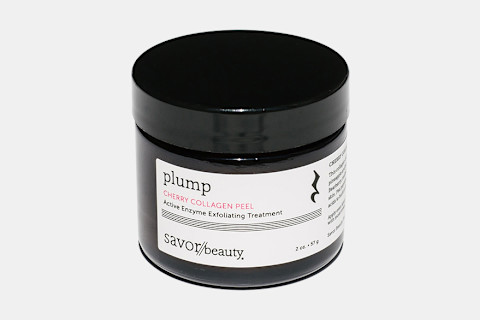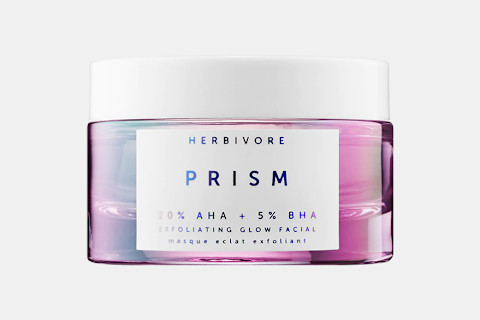Enzymes vs. Acids: Which Exfoliant Should You Use? We Asked The Experts
If you're on a personal quest for glowing, bouncy skin (let's be honest—who isn't?), you likely know that regular exfoliation is key. But just when you think you've gotten the regimen down to a T—studying up on scrubs, peels, and masks aplenty—another nuance makes its way to the skin care conversation. Here's one that trips up even the most well-versed of beauty fans: enzymes versus acids.
Enzymes vs. acids: What's the difference?
While both exfoliate at the chemical level, they do so in slightly different ways. First up: Enzymes are tiny molecules found in fruits (think pumpkins, cherries, and papaya) that break down keratin—aka, the protein in dead skin cells. They get rid of those dead skin cells at the surface of the skin, but they don't exactly promote cell turnover for living cells underneath. Think of enzymes as shedding already dead skin and buffing it smooth rather than a forced cell turnover.
On the flip side, acids penetrate deeper into the skin and accelerate turnover for all your skin cells, not just the dead skin sitting up top: "Acids physically turn over the skin cells (which can cause the actual shedding of the skin), which allows new skin cells to generate," says celebrity esthetician Lisa Guidi, owner of Erase Spa. While also found in natural, plant-based products (lemon, apple cider vinegar, and the like), acids lend a bit more intense exfoliation than the average fruit enzyme.
"Imagine that there is glue between skin cells, keeping them together," explains double-board certified surgeon Melynda Barnes, M.D., clinical director for Rory—an online health care service that creates customizable skin care formulas. "Enzymes break down that glue (the keratin protein), which allows the dead skin cells to be removed or exfoliated from the skin." Acids, on the other hand, "work by triggering cell death in older skin cells and promoting new skin cells to grow. This results in older cells sloughing off and newer skin cells taking their place."
Who should use enzymes?
Enzymes tend to be less abrasive on the skin, as they don't penetrate as deeply into the pores. That said, if you have sensitive skin, you might want to stick to an enzyme-only exfoliating regimen. "Enzymes are great for sensitive skin since they work to break down the proteins found in dead skin cells but do not cause any cellular death or turnover like acids do," Barnes explains.
That's not to say only sensitive-skinned folk can benefit from enzymes; in fact, Barnes notes that enzymes and acids are frequently used together in products for a dual-approach exfoliation. Similarly, Guidi mentions enzymes work for most skin types, especially acne-prone, oily, and combination skin.
Who should use acids?
This is where it gets a bit finicky: Acids are more of a categorical family, with multiple options for varying skin types. For instance, glycolic acid is a lovely AHA, but some skin types may find the exfoliation a bit irritating. Lactic acid, another AHA, is perhaps gentler on the skin (it is a larger molecule, so it doesn't penetrate the pores as quickly or as deeply). Then there are your BHAs, like salicylic acid, that can unclog oil and debris, as well as control excess sebum. You get the idea.
That said, you may have to play around with specific acids to find one that suits your skin care needs. Regardless, Guidi mentions specific concerns like hyperpigmentation, sun damage, and active acne can benefit from that forced cell turnover; however, the process can be irritating for those with super-sensitive skin. If acids are too stripping for your taste, enzymes might be more your style.
The takeaway.
Enzymes and acids, while both effectively exfoliate your skin, have slight nuances to keep in mind. Essentially: Enzymes do the work on the surface and dissolve dead skin, while acids slip deep into the pores to turn over cells. That said, enzymes lend gentle exfoliation perfect for skin that falls more on the sensitive side—whereas acids are fit for those with more targeted concerns, like hyperpigmentation or congested skin. Whether you opt for an exfoliating cleanser, serum, or mask—well, that's up to you.




